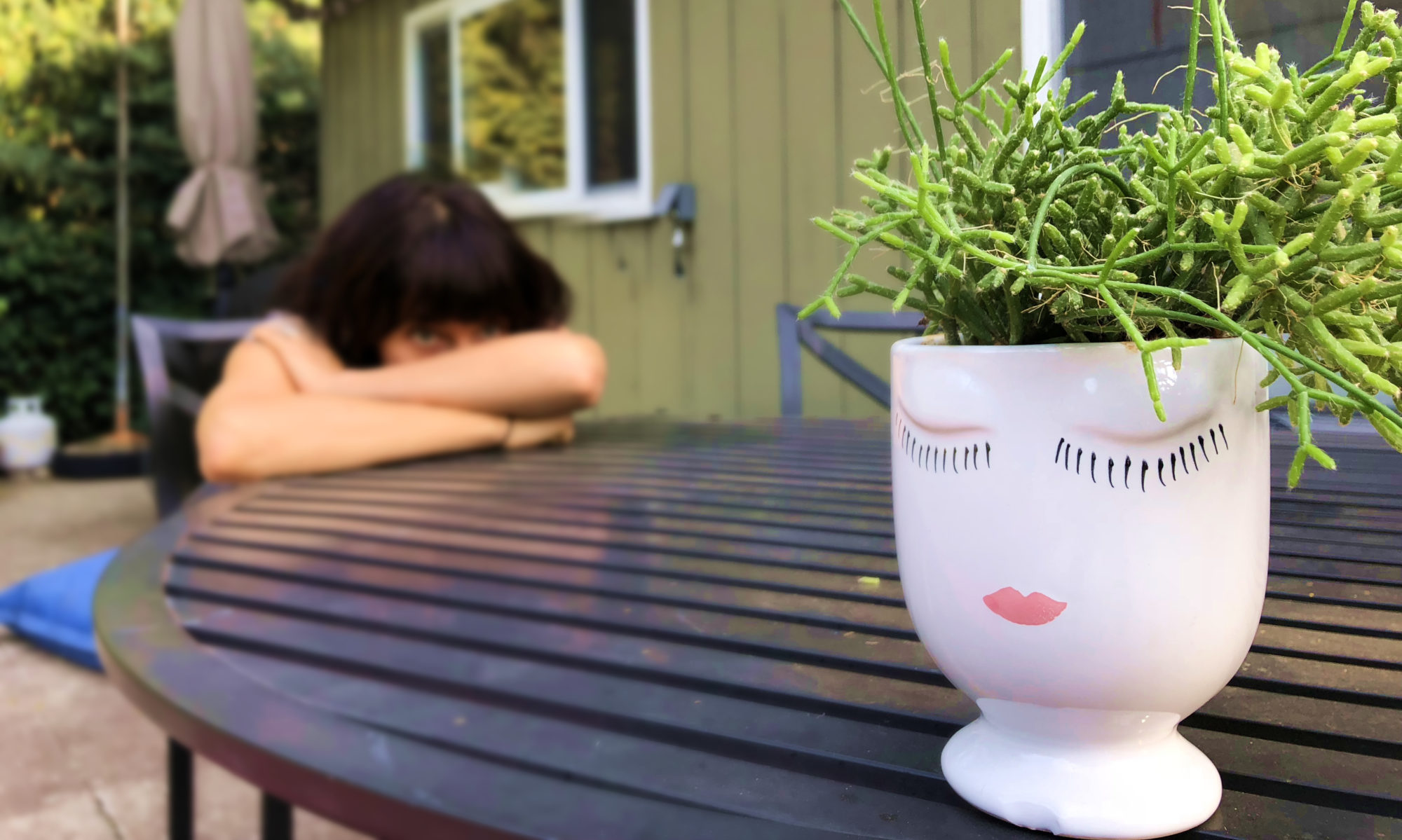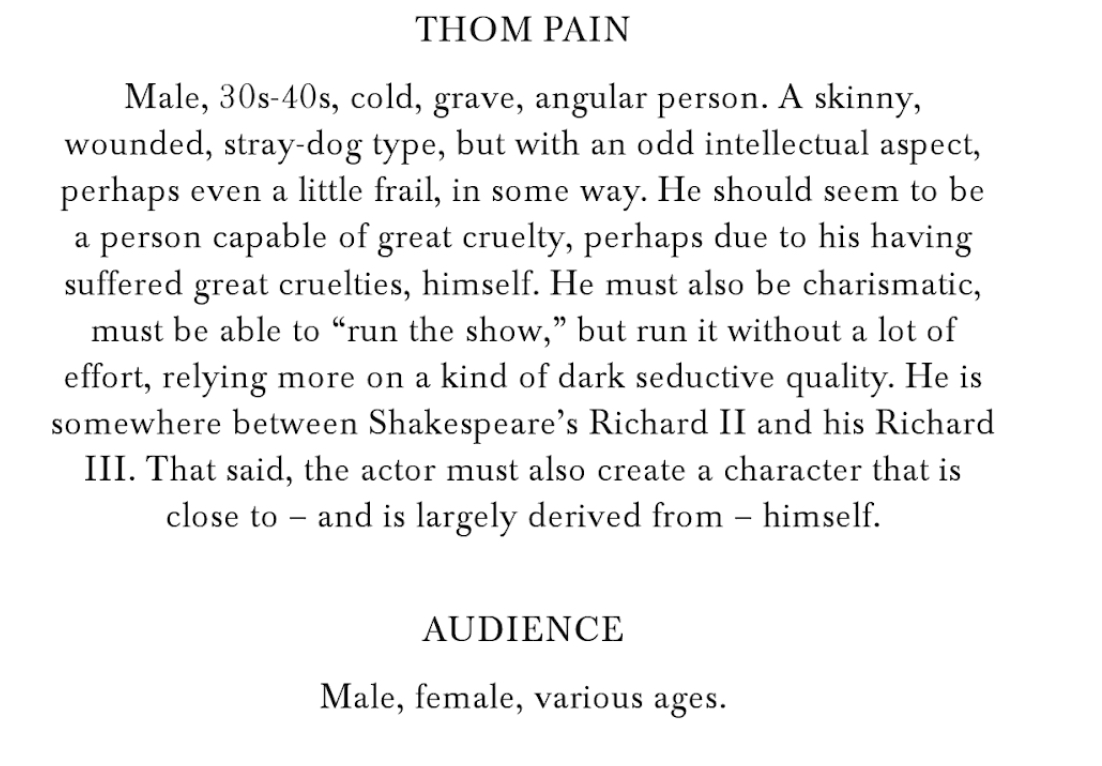I don’t make a regular habit of reading reviews of my work, or anyone else’s. I can tell when they aren’t good, though. I get asked how my show is going instead of being congratulated for it. Or someone will say “so-and-so’s review is waaaay off,” and I’ll feel compelled to investigate further.
Or sometimes I’ll sneak a peek when I’m in the mood to hurt myself. It always works.
I used to read all of them. Bad and good. I was drunk on the strangeness of that kind of formal reckoning. But there were um. Side effects. So.
Luckily, I’ve only been forced to socialize with two human theatre critics; one at an arts festival in Europe and one at a mutual friend’s wedding. In both circumstances, I had to be careful to not over-drink so I wouldn’t start an uncomfortable conversation.
Before we get into that, I want to admit I’m not a total “CRITICS SUCK” kind of gal. Many reviewers write thoughtfully with deep love and respect for the theatre, much the same way a restaurant critic writes about food. They’ll take past work into consideration and synthesize a playwright’s larger cultural goals into their critique, even if their opinion is ultimately negative. They don’t let the pressure of getting eyeballs on their publication influence what they write, and they can have a shitty day and not grind it over a play like seasoning.
In my experience, most theatre critics aren’t like that. But so what? Yes, writing a play is hard, getting it produced is hard, getting it RIGHT is hard, and inviting public praise and/or ridicule from strangers who have no problem letting their mood affect their appraisal is like, masochistic. And yeah, misogyny and unconscious bias and identity politics are often at play, from all genders/races of critics.
But sometimes, a critic is just not that into your writing. It’s all part of the deal; no writer goes into capital-T theatre thinking that’s an avoidable risk. It’s still considered a sign of success (and often a sour badge of honor) to have been smartly castigated by a top tier reviewer.
Bottom line: it’s not our vocation to judge what the critics do, even when they suck. It’s theirs.
Having said that.
The uncomfortable conversation I was afraid of having at both the wedding and the festival was this: I wanted to know to know how these critics were so casually and pleasantly hospitable to my face when they had to know I fucking hated them.
I mean. I deeply, professionally, ferociously hated their guts. (This was years ago. I’m in therapy.) Both reviewers had indirectly suggested I failed at the task I set out to accomplish without ever identifying what it was. They had taken multiple paychecks at my expense for their lazy, imperious writing. Or so I felt.
My main issue wasn’t even about the content. It was about the tone. They’d been so icily dismissive of me so often it felt personal. And here they were in festive attire, making amiable eye-contact, pretending what they’d done hadn’t hurt.
Well, it had, ok? My irrational and misplaced hissy-fit was all about being unfairly judged. I wanted them to feel guilty for getting paid to identify me as dismissible. Because I deserved to be taken seriously.
Which is bullshit. No one “deserves” anything. You can work hard and get lucky, or work less hard and still get lucky, or work really really hard and never get lucky, or work really really hard and get sick before you get lucky. Et cetera.
But at the time, all I knew was my pain. So if I had knocked back a cocktail or three, I may have asked them if they enjoyed being terrible at their jobs, since they’d made it clear I was bad at mine. Or maybe I would’ve quoted their words back to them to watch them squirm.
Instead, I feigned supreme sanguinity. I clutched my single glass of red wine like a life raft and muscled through the mirth. I sprayed the flame of my hatred in the cooling mist of civility, knowing this was temporary.
And then. Months later. I wrote a ten-minute play for a one-night thing where I had several actors attack the audience with the most puffed-up excoriating shit they (and other critics) had ever written. Not just about my stuff. All plays. All playwrights.
It was so freeing and fun to write. But when I saw it performed, it felt like I was parading my smallness around on stage. As if it was something to be proud of. As if I hadn’t just given away all my power.
And for what? Vengeance? Did I actually expect either critic to show up and watch my play and feel something other than pity? Or even remember their own words?
Turns out… one of them was there.
In the audience.
For that play.
They approached me afterwards, laughing oddly. The sound was like a saltine snapping into smaller and smaller pieces.
“I think… I wrote… some of that…”
HERE'S SOME OF WHAT THEY/I WROTE. ACTOR ONE: ACTOR TWO: ACTOR THREE: ACTOR FOUR: ACTOR FIVE: ACTOR ONE: ACTOR TWO: ACTOR THREE: ACTOR FOUR: ACTOR FIVE: ACTOR ONE & TWO: ACTOR THREE & FOUR: ACTOR FIVE: ALL ACTORS: (Beat.) ACTOR ONE:
Carefully plotted and marked by a savage comic flair, you are nevertheless seriously marred by overstatement.
Much of your material is frankly facile, predictable, and too reliant on stereotype.
You verge on the morbid in both your mood and your details.
Your external manners are polished, but your grief remains unseen.
You are sleek and functional, if a little bland and a little glib.
I prefer you when you’re being a nasty ol’ bitch.
Your few soft breaths of self-pity dissolve into the quiet birth pangs of a new philosophy that sees the hollow, provisional nature of worldly stature.
There’s an intelligence to your gaze and a patrician cast to your face that renders you less like a deranged army man and more like a grad student with caffeine d.t.’s.
Looking at you is like spending the night in that sleazy bar I swore I’d never go in, not even to use the bathroom.
Unfortunately, you often mistake frantic pacing for effervescence.
Audiences will leave you and your requisite upbeat ending filled by the menu, but not terribly satisfied.
Your incidental fun, while keeping yourself pleasantly buoyant, only points up the absence of any center.
Your lack of inspiration is saddening, because you invite so much love, and have so much potential for arousing it.
Americans are likely to find you neither surprising nor particularly relevant… you are classy, in your low-class way… you have a cheerfully vulgar New Jersey spirit… you have nothing but coarse obviousness going for you… you have little sense of character… your surrounding elements are too crude… you have no value beyond righteousness… you are creditable but unmoving… you ring hollow in your second half… everything about you smacks of amateurishness… you peak a little early…. your ending is a serious letdown…
…you barely exist.


